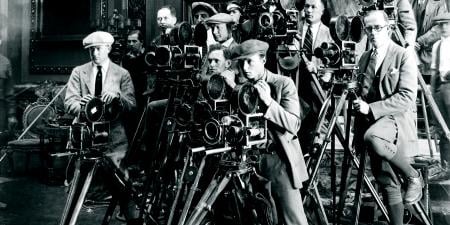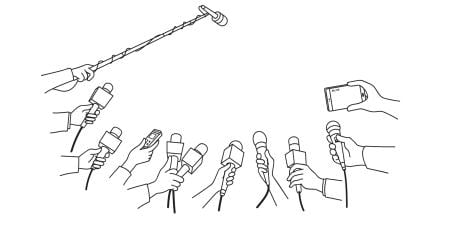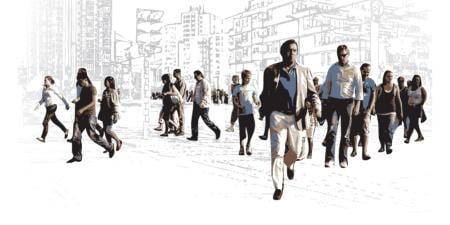Q. Do you know anything about the nomination/selection process by which you were selected?
Foster: They get nominations from many people. President Bush first selected Dr. Leon Kass as chairman of the council. I do not know how much Kass's input counted. I did not know I was being considered until the White House Personnel Office called me to ask me if I would serve. I was considered, I think, because I was chairman of a large Department of Internal Medicine in a medical school (University of Texas Southwestern Medical School) that had 4 Nobel Prize winners, because I was a physician scientist who had been continually funded by the NIH, and because I was a member of the Institute of Medicine of the National Academies. Although I doubt that they knew this, I had also been a trustee of a bioethical think tank called the Park Ridge Center for Health, Faith, and Ethics for a number of years.
This is a council, not a commission. A council is the highest advisory body of the federal government. The parchment of my appointment is signed by both President Bush and Colin Powell, who was then Secretary of State. The Secretary of State has to sign for members of councils. Another characteristic of the council is that all meetings have to be open; there can be no executive sessions.
Hurlbut: I had hints because a few people told me they were going to put my name forward. It's interesting that these were people from both the liberal side and the conservative side. I assume they believed, as I also intend, that my positions would be earnest, well-grounded in science, and sensitive to the concerns of both sides.
Q. What do you think is the specific role of physicians on the bioethics council in contrast to the roles of other scientists and professionals on the panel?
Foster: It is interesting that, despite its name, the council has only a few professional bioethicists. In addition to physicians, there are lawyers, sociologists, political scientists. The physicians are important because they treat real people with real diseases and face real ethical questions all the time. The council's latest volume, to be released this week, is about the care of the aged with dementia. In the last 4 weeks I presided over the deaths of the president emeritus of University of Texas Southwestern Medical School and another professor emeritus who was the founding father of academic rheumatology. Real-life decisions had to be made on whether to intubate, carry out further chemotherapy, etc. In addition, physicians have insight into the diseases potentially approachable by stem cell therapy.
Hurlbut: There are 5 physicians, and with Edward Pellegrino there will be another one, and a very distinguished physician, by the way. The root of your question is, what does a physician bring to a council like this, and I think it's plain that it's a very important role. For questions as difficult as these, we need a range of perspectives—one human being cannot know enough to make pronouncements about the full range of questions with which we are faced.
But I would say that priority must go to medicine. If you don't know the science, forget it, you won't get the questions right. I don't think there should be a professional track called bioethics. About 90 percent of the bioethical literature frets over problems that will never emerge since they are beyond the range of realistic scientific possibility—that's especially true with genetics and neuroscience. Now, one might say about the physician that, even though he knows the problem, he may not have a clue as to how to deal with it, and that is sometimes the case. But, having said that, I think a well-rounded, liberally educated physician is generally better qualified to comment on these questions than a research scientist, a lawyer, a philosopher, or a bioethicist. But no one has the full perspective. What we hope for is to have conversations with a lot of diverse perspectives. And as the process of the council has unfolded, the physicians have made many comments along the line that have been crucial, I think, to making the deliberations realistic, meaningful, and certainly scientifically well grounded.
Q: [asked of Dr. Hurlbut only] What considerations do you think are most of important for selecting people for the council?
Hurlbut: Well, I'm not a political appointee. When I talked to White House staff for the interview no one asked me how I voted. I basically said I'd be comfortable serving my country under this administration and that I wasn't interested in being political—I told them I'd vote for anybody who was against telemarketing.
I don't think the council selected with politics as the primary concern. When we met with the President, he was earnest about the fact that, as a collective society, our country needed help in addressing these issues. He said that these biotechnology dilemmas would define his administration more than any other issues, including terrorism, and he may have been right on that. Cloning, transforming human nature—these are truly serious considerations with deep significance for our civilization and even our species—significance that goes beyond matters of immediate political alignments. I didn't go in with a preset view one way or another toward the President, but I was impressed by him. He spoke with a sensitivity and an honesty that I thought were highly meaningful in a president. He told us he wanted us to present the best arguments on both sides, and that's what we've consistently done. He also told us he wanted us to help engage and educate the public; in other words, that we weren't some kind of intellectual oligarchy that was going to decide the issues on our own. Rather we were invited to stimulate the national process of discussion. He said he wanted our advice, but that these issues were so profound and central to our being that only deliberation through a truly democratic process would suffice to decide them.
Q. Council members do not represent any constituency. What, then, guides your position-taking on the council?
Foster: Council members do get characterized from their previous writings. That might be pro-life, pro-science, pro-stem cell research, anti-stem cell research, etc. Our government is based on the view that its representatives (whether in the Congress or a council or as president) act for the general good. They are influenced by their philosophies and their theology (if any), but decisions are supposed to be reasoned judgments for the good of the people. In the 4 years of the council, it was clear that this process was operating in the members. Discussions have been scholarly, not shrill.
Hurlbut: That's an important point. I have a biographical perspective here. I got to Washington on the day after I was appointed to the council, and, as I do every day, I went running. I remember going by the Washington monument, the Lincoln monument, and it was one of those moments in my life I'll never forget, running along there and thinking about the opportunity given to me. It was very humbling because I knew the magnitude of the topics we were going to deliberate, and I knew how ill-equipped most people in society and even in medicine are for dealing with them. And I knew that we wouldn't have major-league hitting power—this kind of council never ends up immediately changing the world. But I also knew that, with Leon Kass at the helm, this would be a productive, deep deliberation, and, frankly, that has held up. I feel privileged to be invited to be part of the inner circle in these discussions, and what I mean by that is that I feel an enormous responsibility to our entire national heritage, ranging back to George Washington and the very sense of who we are as a nation and our place in history as a uniquely open and democratic system. I feel a great responsibility to be as earnest as I can in search of the truth—a truth that is as universal as possible.
In any governmental body, you cannot escape the fact that people will bring their personal assumptions to the table. But, to the degree that you can find people who are well experienced in intellectual dialogue, you can find people who are neither ethnocentric nor narrow-minded, and I can say that of my colleagues on the council. I myself have traveled to half the countries of the world and seen their realities. This has helped me to realize that there are cultural ways of expressing differences that are very important, but there are also universals. I can see that people all over the world are looking for many of the same things and are going to be vulnerable to some of the same dangers of biotechnology. I also bring some familiarity with a variety of religions, and have sympathy for opposing ideologies. Yet I bring an earnest desire to serve the truth and not anyone's private agenda. I feel zero degree of obligation to side with the President's specific position, and he made it plain that he didn't want us to feel those obligations.
Q. You are physician-educators as well as members of the council. Do you see any conflicts in fulfilling these 2 roles?
Foster: I felt no conflicts in being either a physician-educator or a physician-scientist. I have insights from these 2 roles that I believe are, from time to time, informative. In general, fellow members found these insights helpful, I think.
Hurlbut: Until my appointment to the council my students found me somewhat inscrutable with regard to my opinions on specific issues. A teacher is always caught between talking deeply about the things he or she believes in and over-influencing students by doing so. In my classes I open the questions rather than start with a bunch of assumptions, and my students respond to that. When we talk about evolution, we need to ask, "How did we get here?" And is there anything about the way the world is constructed that would give you any basis for taking a moral position in the first place? That automatically opens questions about the origin and ultimate destiny of the cosmos.
Those are important questions that underlie ethics, and I don't claim to have the answers, but I engage my students in discussing them. And, again, on the President's Council I bring the same search for root sources and values.
Q. Do you think physicians have an obligation to be active in public life?
Foster: When asked to carry out any communitarian function, the physician should consider whether sufficient time is available, whether his or her interest level is high, and whether the duty is an important one to take on. The Bioethics Council was very intensive from time to time, especially when we were all working on the production of volumes for publication.
Physicians are generally very gifted. In America, for example, they have the gift of citizenship and a repertoire of identities available to them, something that someone born in sub-Saharan Africa does not. They are sufficiently gifted intellectually (credit to their genes, not to themselves) that they may go to medical school and practice medicine. Even in times like these, when there is considerable distress in the medical community about reimbursement schedules, malpractice, and diminished incomes, all physicians are in a tiny minority of our citizens in terms of blessings. They will always have discretionary income, even as reimbursement rates fall. I do believe there is an ethical payback requirement to society and to the Universe, if I may put it that way. I have done several communitarian functions in addition to my service on the council. For example, I was elected as a trustee of the Dallas Independent School District and served during the desegregation case that led to our busing order. That was both important and tense. I did medical television on PBS, including 4 seasons where each week I invited an outstanding academician to talk about a medical problem. This series was sold to BBC and shown also in Europe. I have been active in the peer review and other systems of the NIH almost throughout my career: Study Section, NIDDK Council (National Institute of Diabetes and Digestive and Kidney Diseases), search committees, and 10 years on the Board of Scientific Counselors of the NIH Clinical Center. Another requirement, in my mind, for academic physician-scientists, is that they serve as editors, reviewers, and writers of textbooks.
Hurlbut: I've always been ambivalent about physicians in public life. I certainly think that they need to bring their scientific expertise and medical experience into the conversation. But as a physician I'm trained to be a caregiver on an individual basis. And in a strange sort of way there's almost a conflict in social policy. You know you have a patient who is potentially dangerous or is harboring a dangerous disease, and you can't take him and lock him up or advocate to have him committed. As physicians we are rigorous advocates at the level of individual patients; we are not sociologists, or social theorists, or economists, or people weighing these issues on the scales of politics and legislation. I find myself involved in the political process now, not really in a partisan way but in trying to promote a solution to what I think is a partisan conflict. I'm learning a lot about the political process, some of which is discouraging indeed (you know that old saying, never ask what goes into making sausages or laws) but also conceptually important. I've had conversations on stem cell biology with Orrin Hatch, George Allen, Senator Brownback, and Senator Frist, who, I think, have thoughtful, earnest intentions to seek solutions. And as a physician I feel comfortable doing that because I'm not telling them what to decide. I'm a resource of information.
Now, I have to pause and answer your question by saying something different than what I just said, because I think that biology is becoming so important that we do need specific legislators to work on science and medicine, and I think that there's a place for physicians with good experience and a talent for public policy to step out and leave their practices behind in the service of the nation. I think we'll probably be at a point soon where we would benefit from a president who is also a physician. Maybe not, I don't know for sure, but I think it helps to have senators and representatives who are physicians. I think physicians should not use what you termed "advocacy" so much as really sincere understanding of the issues and leadership. I would say the best way to serve is by keeping the dialogue realistic, and physicians can do a great job of that. If physicians become like an advocacy community, or a lobbying group, or a labor leader, that would be unfortunate. As physicians we are dedicated to the social good and should promote that and not ourselves.



